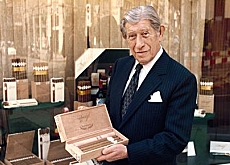Davidoff celebrates cigar centenary

It's 100 years since the birth of Zino Davidoff, one of Switzerland's most colourful characters, whose life and enjoyment revolved around one thing – the cigar.
Cigar lovers everywhere know the name Davidoff, which has since the entrepreneur’s death in Geneva in 1994 been transformed into a brand of luxury consumer products.
“The cigar has been my life. I owe it everything: my deepest pleasure and my anguish, the joys in my work as well as my leisure time.
“And if I have acquired over the years some bit of knowledge and philosophical stance, again I am in debt to the cigar,” he wrote in his best-selling book – The Connoisseur’s Book of the Cigar.
To celebrate his life, the cigar company has put together an exhibition titled the “Thank you Zino tour” which will make stops in cities across the United States, Germany and Switzerland.
Davidoff was born on March 11, 1906 in the Ukrainian city of Kiev and the first aroma to have greeted him was from oriental tobacco that his father secretly used to roll cigarettes for friends in the family home despite official bans.
Flight to Geneva
At the age of five, Zino and his family fled from the pogroms and reached Geneva in 1911. Here Zino’s father opened a small tobacco shop that rapidly became a popular meeting point for exiled enemies of the tsar.
One of the exiles stuck in the young boy’s memory because he didn’t pay for his cigarettes and his father didn’t dare ask.
“He had a thin face, brilliant eyes, and spoke loudly as he demanded his cardboard-tipped “papirosi” or Russian cigarettes.
His name was Vladimir Ilyich Ulyanov, who left Zurich in a sealed train in 1917 to return to his homeland, later adopting the name Lenin.
Shunning a university education, Davidoff in the 1920s travelled the tobacco plantations and cigar factories in Argentina, Brazil and Cuba, where he discovered his great love of tobacco which was to last all his life.
In the capital, Havana, he learned everything there was to know about the cultivation, storage and exploitation of Cuban cigars.
Prime address
Returning to Geneva in 1930, he expanded his father’s business with a cigar department that soon became a prime address for imported Cuban cigars, particularly during the Great Depression.
As a result of his good relations with Cuba, Davidoff was allowed to take charge of their large cigar warehouse in Paris before the Germans invaded France, with the result that he was for some time the only dealer able to supply Havana cigars.
After the war years, the Cubans and Davidoff launched an offensive to conquer the European cigar market, with Zino coming up with a novel and highly successful idea to name cigars from the “grand cru” wines of France.
In recognition, his Cuban friends offered to produce his own line for him in 1970.
It was in that year that Davidoff sold the business at the peak of his career to an old family company Oettinger of Basel. Its head, Ernst Schneider had first met Davidoff at the end of the 1940s.
Open arms
“He was a very charming person and he welcomed his clients with open arms. This came from the heart. All his customers felt that Zino was their friend,” Schneider told swissinfo.
The feeling was mutual because Davidoff was proud of his achievements.
“When I open my orders books I realise that there isn’t a man on earth who hasn’t among his clientele – and his friends – more kings, dukes, millionaires, adventurers or stars,” he wrote.
Together they decided that the brand would go a new way, one of the reasons being a quality issue with Cuba.
After evaluating a number of tobacco-growing areas, the two friends decided in the early 1990s on the Dominican Republic, where Davidoff cigars are still made today.
Own way
“We changed because we were convinced to go our own way and have the whole production from the start to the end in our own hands.
“We took the risk and everybody said when we changed from Cuba to the Dominican Republic that it would be a failure, but we have proved to be very successful,” Schneider added.
Davidoff died in January 1994 in Geneva, leaving behind what Schneider describes a message that “a cigar is a pleasure and [way of relaxing] in our hectic and nervous times”.
The highly respected Davidoff would have agreed with that because his credo was: “Smoke less, but better and longer – make a cult of it, even a philosophy!”
swissinfo, Robert Brookes
Zino Davidoff wrote that when he left for Cuba as a young man, it was “the way a young archaeologist might [leave] for Greece or a seminarian for Rome”.
He spent two years there “in a state of complete excitement”.
Davidoff was initiated on a farm to all aspect of manufacturing cigars – “from the cutting of the plant to packaging, through the stages of gathering the leaf, fermentation, drying, dividing and rolling”.
He wrote that he was curious and excited about everything, and not satisfied until he knew all there was to know about a Havana.
Zino Davidoff was born on March 11, 1906 in the Ukrainian city of Kiev.
When Zino was five, the family fled from the pogroms in tsarist Russia to Geneva, where his father opened a tobacco shop.
The Davidoff cigar factory opened in Havana in 1970.
In 1991 Davidoff and his partner Ernst Schneider developed a new generation of cigars using tobaccos from the Dominican Republic.
Davidoff died in Geneva on January 14, 1994.

In compliance with the JTI standards
More: SWI swissinfo.ch certified by the Journalism Trust Initiative









You can find an overview of ongoing debates with our journalists here . Please join us!
If you want to start a conversation about a topic raised in this article or want to report factual errors, email us at english@swissinfo.ch.